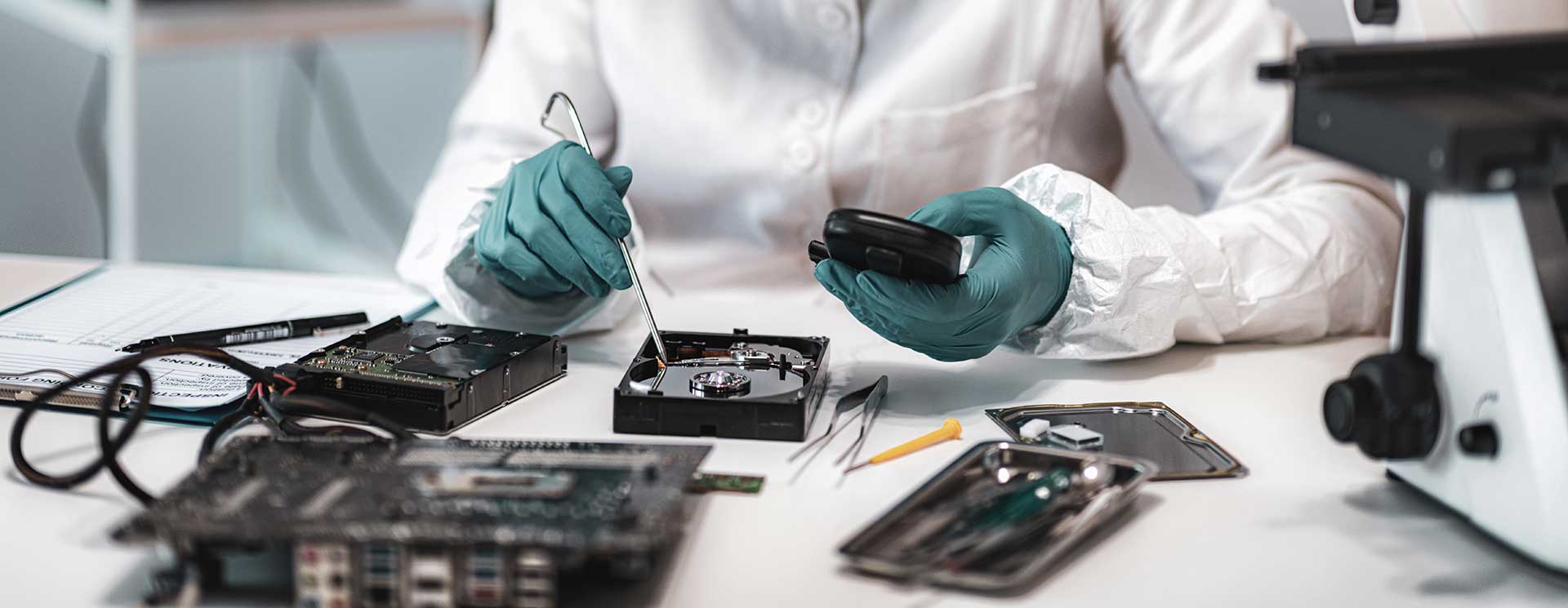
Study how to understand, prevent, and investigate cyber attacks Enquire now
| Mode: | 100% online (with optional face-to-face events) |
| Length: | 2 years (part-time) |
| Fees: | £10,500, including a £350 acceptance fee (funding and instalments available) |
You can also study an MSc in Cyber Security and Forensic Information Technology on-campus.
Today’s cybersecurity landscape is more dynamic than ever, with new threats popping up every day that affect us all. This is why organisations need experts with the knowledge, foresight and confidence to prevent their data from getting into the wrong hands. Are you ready to become one of these experts?
On this course, you'll develop a well-rounded view of your field – from developing the expertise to safeguard peoples’ data to predicting attacks, analysing cybercrime, and designing robust IT infrastructures.
Dive into every facet of the field – from predicting, preventing and analysing cyber-attacks to fostering a security-first culture.
The real-world insights you gain can immediately be applied to your current job.
Get remote access to industry-standard technology hosted in our labs.
You’ll get to attend an online court hearing with a judge presiding as part of your assessments.
On this course, you’ll:
All course materials are available in our easy-to-use Digital Learning Environment and can be accessed from wherever you're based. Find out more about learning online with us.
Your studies for this module will provide a strong grounding in mobile systems architecture, mobile applications, and mobile forensic analysis. The coursework will encourage you to consider the wider business and social contexts in which mobile devices are used and abused.
As part of this module, you will learn about MSAB XRY software. This is a verified mobile forensics tool accepted in a court of law to perform logical and physical data acquisition from mobile devices.
Your Master’s Study Project will give you the chance to apply your learnings to research and address a real-world problem. For example, you can choose to take on a specific cyber security challenge faced at your current organisation.
Previous dissertation topics by our on-campus students include:
Watch this extract from an online webinar where Course Leader Dr. Mo Adda discusses the dissertation as well as hot topics in the field:
Read the video transcript on this page
All assessments for this course are based on coursework submitted online. Your performance is assessed through:
You'll also receive formal and informal tutor feedback to help you improve future work.

Professor
Sed ut perspiciatis unde omnis iste natus error sit voluptatem accusantium doloremque laudantium, totam rem aperiam, eaque ipsa quae ab illo inventore veritatis et quasi architecto beatae vitae dicta sunt explicabo.
 Find out more
Find out more
Professor
Sed ut perspiciatis unde omnis iste natus error sit voluptatem accusantium doloremque laudantium, totam rem aperiam, eaque ipsa quae ab illo inventore veritatis et quasi architecto beatae vitae dicta sunt explicabo.
 Find out more
Find out more
Professor
Sed ut perspiciatis unde omnis iste natus error sit voluptatem accusantium doloremque laudantium, totam rem aperiam, eaque ipsa quae ab illo inventore veritatis et quasi architecto beatae vitae dicta sunt explicabo.
 Find out more
Find out more
Professor
Sed ut perspiciatis unde omnis iste natus error sit voluptatem accusantium doloremque laudantium, totam rem aperiam, eaque ipsa quae ab illo inventore veritatis et quasi architecto beatae vitae dicta sunt explicabo.
 Find out more
Find out more
Professor
Sed ut perspiciatis unde omnis iste natus error sit voluptatem accusantium doloremque laudantium, totam rem aperiam, eaque ipsa quae ab illo inventore veritatis et quasi architecto beatae vitae dicta sunt explicabo.
 Find out more
Find out more
Professor
Sed ut perspiciatis unde omnis iste natus error sit voluptatem accusantium doloremque laudantium, totam rem aperiam, eaque ipsa quae ab illo inventore veritatis et quasi architecto beatae vitae dicta sunt explicabo.
 Find out more
Find out more
Discover the key terms professionals in the field need to know:
To join this course, you must have:
When applying, you’ll also be required to submit:
Not sure if you’re eligible to apply? We know everyone’s path to postgrad study is different, so please phone our Course Adviser team on +44(0)23 9431 1545, or email info@study-online.port.ac.uk if you think you'd be a good fit.
On this MSc you'll gain the research capabilities and expertise essential for protecting businesses from online threats. Develop key soft skills such as communication and collaboration, enhancing your ability to integrate into diverse teams and work environments.
Enhance your appeal globally
Leverage our Careers and Employability Service for support, enhancing your appeal to global employers.
Network internationally as one of our Alumni
Join our Alumni Association post-graduation to network with cyber security professionals, gaining insights and potential career opportunities.
I’m a Principal Lecturer at the University of Portsmouth. My research interests include network security, multithreaded architectures, mobile networks and business process modelling, mobile intelligent agent technology, IoT forensics, and general aspects of digital forensics and cyber security.
"Students will maximise their career potential through developing knowledge and skills in digital forensics and cybersecurity. They'll also build research skills and techniques that will help them undertake a PhD or research- and teaching-related jobs.”
Dr Mo Adda
Course Leader
The Formula Student Car really attracted me so it’s no shock that I’ve ended up on the team! We race in July and spend the whole year designing, manufacturing and testing the car before the big day.
Adele Gibb
Mechanical Engineering Graduate
Got a question about our courses? Complete the form below and a member of our course adviser team will contact you shortly.
© 2024 University of Portsmouth Cookies Accessibility Modern slavery Privacy Website terms & conditions